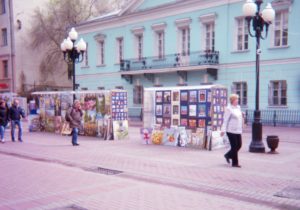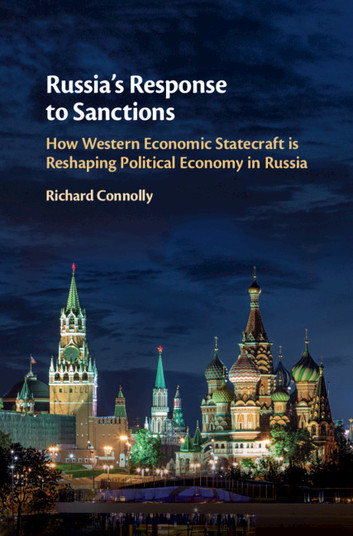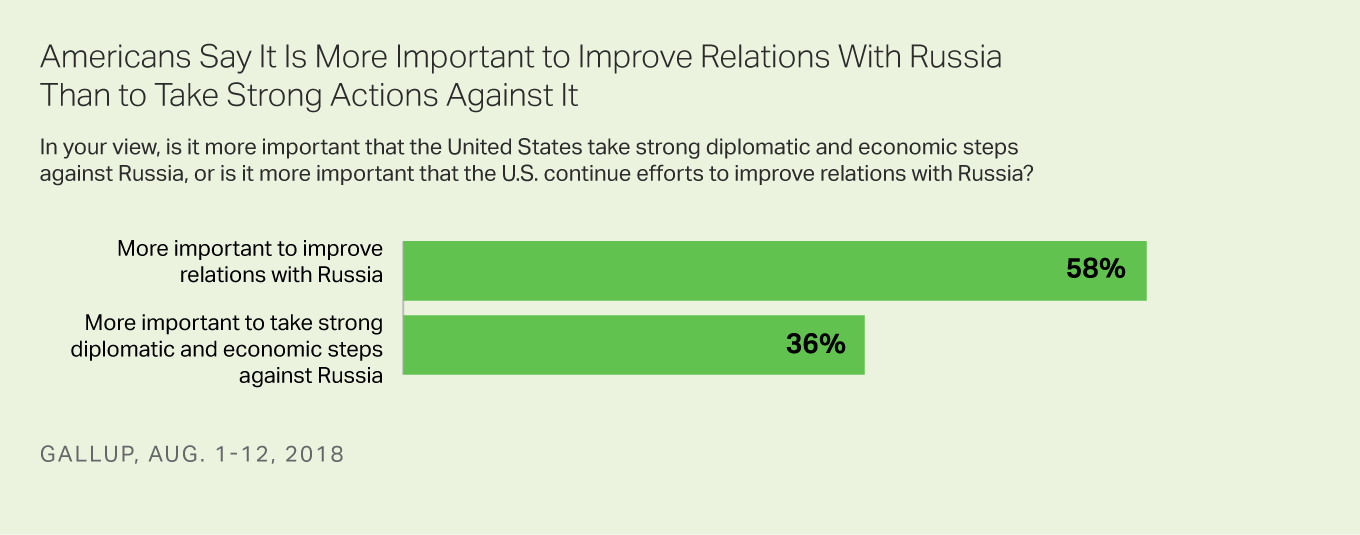
I found it interesting that within one week I saw write-ups of different sorts about the value and effect of sanctions by two Russia analysts I respect.
The first is a book review by Paul Robinson posted at his Irrussianality website. Based on his write-up, I’m glad that Robinson made me aware of Russia’s Response to Sanctions: How Western Economic Statecraft is Reshaping Political Economy in Russia by Richard Connolly.

As Robinson points out, an academic attempted a serious look at western sanctions against Russia since 2014 and how Russia has responded to them. Connolly, a professor at the University of Birmingham, also has taken the time to try to understand – at least, to some degree, how Russia’s economy actually works – thus providing a better contextual understanding of the actual effect of the sanctions, which are likely not the effects intended by Washington policymakers who, as I’ve harped on previously, are dangerously ignorant of the nation to which they’re forming policy and approaches to. As Robinson notes:
According to the University of Birmingham’s Richard Connolly, however, ‘do sanctions work?’ is the wrong question, or at least it’s a question that can’t be answered until other questions have been answered, most notably ‘what is the effect of sanctions on the targeted country?’ And to answer that question you have to consider other ones, such as ‘how exactly do sanctions impact the targeted country?’ That in turn requires one to investigate in depth the political and economic structure of the target to understand how it operates and how it responds to external pressure. Every country is different, and operates according to a set of ‘intricate relations’ between the state, its citizens, and the various institutions within it. As yet, however, studies of the sanctions imposed on Russia have not sought to take these into account, leading to simplistic analyses. As Connolly says in his new book Russia’s Response to Sanctions, ‘Policymakers and other public figures prone to making hyperbolic statements about the state of the Russian economy today, and then using those statements as a basis for formulating policy and attitudes towards the country, often appear to do so without the aid of even a rudimentary understanding of Russia and its economy.’
Ya think?
Robinson gives us a look into how Connolly provides interesting insight into aspects of Russian political economy, particularly rent sharing, that are critical to anyone who wants to understand Russian political economy in general as well as those formulating policies that will determine future relations:
According to Connolly, the key feature of Russia’s economy is that profits earned in those parts of the economy which are globally competitive (primarily, though not exclusively, energy industries, and which Connolly calls Sector A) are redistributed by the state to support industries which are not globally competitive (Sector B) through direct subsidies, preferential access to credit, and so on, in other words through what economists call ‘rent sharing’. This sustains a fairly large domestic industrial base (contrary to criticisms that Russia doesn’t produce anything), but one which exports very little and focuses on the domestic market. It also ties the state (as the rent redistributor) and domestic producers together in complex networks of dependency, while making the state the primary actor in the economy (thus making it more accurate to talk of Russian political economy than just economy).
Although, as is pointed out, this has costs in terms of efficiency and innovation, it has had its advantages in terms of dealing effectively with the West’s tendency to use its economic might in a punitive fashion:
Connolly argues that the Russian state has responded in three main ways to sanctions: 1) securitization of the economy; 2) import substitution/localization, 3) diversifying its external economic links.
The first of these means that the Russian government has increasingly looked at the economy through the lens of national security, and been willing to experience some economic costs in order to enhance that security. Securitization has also inclined it further towards the other two measures (import substitution and diversification) in order to decrease Russian dependency on the West.
In his sections on the energy, defence, and financial industries, Connolly shows how import substitution and diversification have worked in practice. In the oil and gas industries, for instance, Russia has been highly dependent on imports of foreign technology to assist in the more difficult resource extraction projects. To address this deficiency, Connolly reports that ‘the government allocated considerable financial resources to support the development of energy extraction equipment in Russia’, as well to projects such as the Zvezda shipbuilding complex in the Far East. At the same time, it began to purchase more and more technology from China and other non-Western sources. The strategy was thus not ‘deglobalization’ but ‘reglobalization’.
Similar patterns can be observed in the defence and financial sectors. For instance, to compensate for the loss of Ukraine as a supplier of crucial components, large sums of money were invested in creating alternative Russian sources of supply. At the same time, Russia increased defence cooperation with China. Likewise, in response to Western financial sanctions, the Russian state moved to provide direct support to Russian banks and to help large cooperations like Rosneft pay their foreign loans. It also developed alternatives to the SWIFT electronic payment system and Western credit rating agencies and introduced the Mir credit card to replace VISA and Mastercard, while seeking out new sources of capital in non-Western states.
According to Robinson, Connolly effectively argues that, in spite of some short-term discomfort, Russia has been able to successfully counter the worst possible effects of western sanctions and even encourage the stimulation of alternative economic investment that will strengthen agriculture and some industry and finance.
After explaining how Russia has actually responded to western sanctions, Connolly turns to the question of how effective those sanctions have been in terms of what their presumed intent was – to cause significant economic harm to Russia, with the idea that this would encourage political revolt that would endanger Putin’s government. The answer, not surprising to anyone who has followed this blog, is that Washington has once again – in its hubris and ignorance – been hoisted on its own petard:
First, it has created a system that ‘is less vulnerable to external pressure’ than that which existed before, in that it is more independent from the West. Second, it has accelerated a shift in Russia’s place in the global economy towards the East. This obviously has political ramifications which Connolly does not explore. Somewhat perversely, Western sanctions have reduced, not increased, Western leverage over Russia. This is probably permanent.
On that note, Nicolai Petro recently published an op-ed in The National Interest in which he discusses how the excessive use of sanctions to punish nations who don’t do what they’re told by Washington and it’s merry band of sycophants, has been largely ineffective in changing behavior more to Washington’s liking as it tends to rally the citizens of the target country around their leader and harden their resolve.
According to Petro, since sanctions are largely ineffective, Washington’s overuse of them must be rooted in something else.
The best way to think about the role of sanctions in American foreign policy is to regard it as an addiction.
Think about it. The inability to change the behavior of even the most rinky-dink nations must be enormously frustrating to those at the helm of the world’s lone superpower. This leads, not surprisingly, to the search for ways to assuage this sense of failure and reassure Americans of their perpetual global dominance. Sanctions fit the bill perfectly. First, because they can be sold as an alternative to war. Opponents of sanctions can thus be portrayed as either warmongers or pacifists, depending on their political profile. Second, since no meaningful measures of success or failure are ever discussed, success is entirely in the eye of the beholder. Thus, whatever happens can be attributed to sanctions —if it suits the government. Politicians can hardly be faulted for the eagerness with which they embrace sanctions. They offer the perfect escape from the real, but tedious, world of diplomatic negotiation.
Eventually, however, the political “high” provided by sanctions wears off. The nastiness of the world intrudes, and once again politicians become desperate for another fix. Friends try to warn Americans that Washington’s increasingly erratic behavior is beginning to hurt them as well, but how can they understand the burdens that America must bear as Leader of the Free World? Eventually, as Americans’ view of the world shrinks to the confines of the Washington Beltway, nothing but their own media-driven reality matters. Sanctions now provide the only semblance of calm, the only relief that politicians can rely on, and so resort to them becomes habitual.
Read the complete op-ed here
**************************************************************************
A few weeks ago, Kentucky senator Rand Paul took a trip to Russia and met with members of the Russian legislative body as well as Mikhail Gorbachev and others. During that visit, he invited Russian lawmakers to visit with their counterparts in Washington. Reportedly, the Russians accepted the invitation but I’m not aware that a date has been confirmed as to their visit.
Paul wrote an article for The Atlantic recently about the aspect of his trip involving his visit with Gorbachev. In the following excerpt, he tells of the former Russian leader’s epiphany about the dangers of nuclear weapons and why the pursuit of nuclear disarmament was so important to him:
On my recent trip to Russia, I spent an hour with Mikhail Gorbachev. I told him that in the West we are grateful that he and President Ronald Reagan defied Cold War orthodoxy to significantly reduce our countries’ nuclear arms. And I asked him whether there was a moment in his life when he’d realized that he might shape history.
He paused a moment and then recounted how as a young man, he had watched a film on the devastation that would occur with nuclear war. He and the other young officials in the room looked at each other in shock as the film concluded.
Gorbachev recalled the scene: “Even though I am not a believer, I responded, ‘Oh my God!’” From that moment, Gorbachev said, he decided to use every opportunity that came his way to prevent a nuclear holocaust.
Even more recently, Paul spoke to the Foreign Relations Committee about what he thinks could be offered as “a carrot” in negotiations with Russia – namely, agreeing that Ukraine and Georgia will not join NATO. Here is a short video of what he said from CSPAN:
Former USAID project officer and “adviser” on economic development in the former Soviet Union (which is likely not to his credit) Josh Cohen has written about the leaked memo of what Putin planned to discuss with Trump at their Helsinki meeting last month. Cohen acknowledges that Putin’s reflected desire to extend the START treaty that expires in 2021, take steps to reaffirm the 1987 INR Treaty, and implement risk reduction measures between NATO and Russia in Eastern Europe where their respective militaries have had run-ins, is a very good sign for negotiating the most important security aspects of U.S.-Russia relations.
A leaked Russian document published by Politico this month revealed that during their July 16 summit in Helsinki, President Vladimir Putin presented Trump with a series of proposals related to nuclear arms control, as well as other measures to reduce the risk of military conflict between the U.S. and Russia. Putin’s proposals promote American interests, and Trump should respond positively by directing his administration to begin immediate discussions with their Russian counterparts.
First, Putin suggested that Washington and Moscow extend the New Strategic Arms Reduction Treaty (New START) — a step that many high-level American, European and Russian nuclear experts have called for. New START would limit the total number of deployed strategic warheads each side can deploy to 1,550 — still more than enough to destroy each other and the planet many times over.
New START also contains a number of valuable verification and confidence-building measures. Each side is permitted up to 18 short-notice on-site inspections each year, as well exchanges of telemetry and other data. New START also established a Bilateral Consultative Commission to meet at least twice a year in Geneva. Both are critical confidence-building measures that reduce the risk of surprises and misunderstandings. Put simply, extending New START is in America’s national interest because it reduces the risk of nuclear war.
U.S. politicians should make sure their priorities are straight, set aside petty partisan politics, and respond constructively to the offer made by Putin, which is totally in keeping with Putin’s past numerous overtures toward Washington.
After all, if everyone dies in a nuclear war, no one will be left to give a damn who lost the 2016 election.
Apparently, something close to this sentiment is shared by many of my fellow Americans according to a recent Gallup poll.

**An upcoming post will feature a review of Tony Kevin’s Return to Moscow.